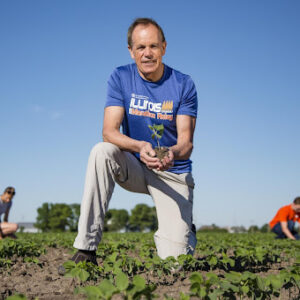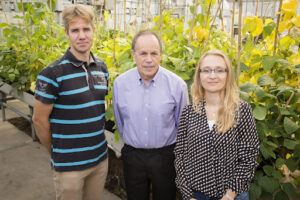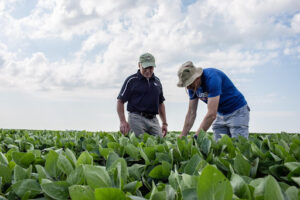
Stephen Long, the Ikenberry Endowed Chair of Plant Biology and Crop Sciences at the University of Illinois, is the director of an innovative project called Realizing Increased Photosynthetic Efficiency (RIPE). Based at the Carl R. Woese Institute for Genomic Biology, Long leads an international team of researchers who dedicate their efforts to improving the photosynthetic process—ultimately increasing crop yields for farmers all over the world.
Photosynthesis—the natural process that all plants use to convert sunlight into energy—is one of the most basic processes known to science. Seemingly simple, photosynthesis, in reality, has 170 steps that all need to work together in order to fuel plant growth. Prior to RIPE Long asked whether investment of resources within these 170 steps was optimal for maximizing productivity. He likened this to a car production line. Imagine you have 1000 workers, how do you distribute them to maximize productivity?
Long’s group addressed this question by simulating the whole photosynthetic process with high performance computing. The work showed several points where redistribution could increase performance. The work attracted the interest of the Bill & Melinda Gates Foundation, who provided funding to test these predictions in practice, leading to the formation of the RIPE team, which has set about testing the computer predictions in practice.
The work has involved first testing these predictions in tobacco. Tobacco sounds a very odd choice, but it is used because it is easy to bioengineer and produces large numbers of seeds, allowing the team to go from genetic modification to replicated field trials in 12 months – for most food crops this would require 4 years! Tobacco serves as a test-bed, and if the modification results in increased production here, the team moves to food crops.
Three of the computer predicted improvements have now been shown to work in tobacco and are moving into food crops including rice, cassava, soybeans, and cowpeas. Cassava is a vital source of calories for the smallholder farmers of sub-Saharan Africa, and cowpea their largest source of vegetable protein. Providing varieties with increased productivity to these farmers could be transformative for their livelihoods.
“We don’t know for certain this approach will work in other crops, but because we’re targeting a universal process that is the same in all crops, we’re pretty sure it will,” Long said.

Recently, Long and his research team published a study in Science that increased plant productivity by boosting the levels of three proteins involved in photosynthesis. Along with his postdoctoral researchers Katarzyna Glowacka, now an assistant professor of biochemistry at the University of Nebraska and Johannes Kromdijk, now a lecturer at the University of Cambridge, Long discovered a 14 to 20 percent increase in plant growth in their modified tobacco plants.
In another successful breakthrough for the RIPE team, Long’s team improved how crops utilize water by 25 percent without compromising yields. By engineering crops to conserve water and better resist droughts, RIPE researchers are promoting more efficient crop growth while also finding solutions to address the looming threats of drastic, changing climate conditions.
“My attitude is that it is very important to have these new technologies on the shelf now,” Long said. The population of sub-Saharan Africa is set to double by 2050. “It can take 20 years before such inventions could reach farmer’s fields—if we don’t do it now, we won’t have this solution when we need it.”
Long’s work has been published in over 300 peer-reviewed journals, including Nature and Science. He has also given briefings on food security and bioenergy to the United States president, the Vatican, and to Bill Gates. Clarivate Analytics (formerly Thomas Reuters) has recognized Long as a highly cited researcher in the field of plant and animal science each year since 2005. In 2013, Long was named a Fellow of the Royal Society of London, the oldest continually operating society that honors leading scientists and engineers. He was elected to the US National Academy of Sciences in 2019.
- Carl R. Woese Institute for Genomic Biology – 1206 West Gregory Drive, Urbana, IL 61801
Głowacka, K., Kromdijk, J., Salesse-Smith, C. E., Smith, C., Driever, S. M., & Long, S. P. (2023). Is chloroplast size optimal for photosynthetic efficiency? New Phytologist, 239(6), 2197-2211. https://doi.org/10.1111/nph.19091.
Long Lab. (N.d.). About Us. https://lab.igb.illinois.edu/long/about.
Long, S. P. (N.d.). Stephen P. Long. University of Illinois School of Integrative Biology Directory. https://sib.illinois.edu/directory/profile/slong.
RIPE Project. (N.d.). Our Story. https://ripe.illinois.edu/objectives/our-story.

